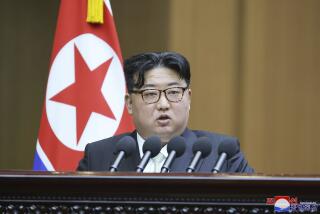North Korea changes course, calls for talks with South
SEOUL -- In a sudden change of heart, North Korea called Thursday for talks with South Korea about reopening a shuttered industrial park and restarting tourist exchanges and reunions of separated families.
Seoul almost immediately accepted, setting the stage for the first talks since the twentysomething, hot-headed Kim Jong Un took over the leadership of North Korea after the death of his father, Kim Jong Il in December 2011.
North Korea analysts said the timing of their proposal was strategically planned, as it came a day ahead of President Obamaâs meeting with Chinese leader Xi Jinping. Xi met recently with a special envoy sent to Beijing by Kim Jong Un and urged the North Koreans to drop their implacable hostility to Seoul.
In Seoul, the Unification Ministry -- which handles North Korea relations -- said there was no date or agenda set for what would be working-level talks. It does not appear that the talks will address more substantive matters, such as North Koreaâs nuclear program. âWe hope the talks will become an opportunity to help forge trust,â the ministry said in a statement.
âNorth Korea is showing they are willing to move toward negotiation and dialogue. This is to give China a better position when Xi Jinping meets with Obama,â said Koh Yoo-hwan, a professor of North Korean studies at Dongguk University in Seoul.
Still, it came as a surprise given that Pyongyang has for months rejected all offers of talks from Seoul, calling attempts at diplomacy a âcrafty trick.â
The statement released Thursday came from North Koreaâs Committee for the Peaceful Reunification of the Fatherland.
âWe call for meeting between authorities to normalize Kaesong Industrial Complex and reopening of Mount Kumgang Tourist Region,â Pyongyangâs official KCNA news service reported. âIf necessary, we could negotiate humanitarian issues such as bringing together separated families.â
The statement referred to the anniversary of a landmark June 15, 2000, summit in Pyongyang between North Koreaâs Kim Jong Il and then-South Korean President Kim Dae-jung, who won the Nobel Peace Prize as a result of his so-called âSunshine Policy.â
The visit set the stage for various well-publicized projects, like the Kaesong industrial park located just north of the demilitarized zone, and South Korean tour buses to the scenic Kumgang mountain on the east coast. For the first time since the 1950-53 Korean War, roads and rail lines were reconnected.
But for all the hype about brotherly love between the Koreas, the rapprochement policy eventually fell apart, strained by North Koreaâs weapons programs and resentment by South Koreans that they were being cheated.
The tours were suspended in 2008. The Kaesong industrial zone, which provided North Korea with some $90 million in hard currency, closed last month amid a frenzy of threats and accusations from Pyongyang.
Deng Yuwen, a Beijing-based foreign policy analyst, said Thursday that pressure from the Chinese government wasnât the only factor pushing North Korea back to the table.
âInternally, I think the North Koreans realized that they couldnât continue with their war tactics. It was not sustainable. They have to make things work with South Korea,ââ said Deng.
Choi reported from Seoul and Demick from Beijing
More to Read
Sign up for Essential California
The most important California stories and recommendations in your inbox every morning.
You may occasionally receive promotional content from the Los Angeles Times.










